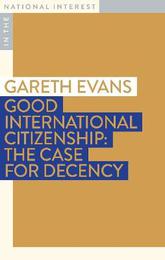
|
Good International Citizenship: The Case for Decency
Paperback / softback
Main Details
| Title |
Good International Citizenship: The Case for Decency
|
| Authors and Contributors |
By (author) Gareth Evans
|
| Series | In the National Interest |
|---|
| Physical Properties |
| Format:Paperback / softback | | Pages:96 | | Dimensions(mm): Height 175,Width 111 |
|
| ISBN/Barcode |
9781922464972
|
| Classifications | Dewey:338.9194 |
|---|
| Audience | |
|---|
|
Publishing Details |
| Publisher |
Monash University Publishing
|
| Imprint |
Monash University Publishing
|
| Publication Date |
1 March 2022 |
| Publication Country |
Australia
|
Description
Why should we in Australia, or any country, care about poverty, human rights atrocities, health epidemics, environmental catastrophes, weapons proliferation or any other problems afflicting faraway countries, when they don't, as is often the case, have any direct or immediate impact on our own safety or prosperity? Gareth Evans' answer is the approach he adopted when Australia's foreign minister. He argues that to be, and be seen to be, a good international citizen-a state that cares about other people's suffering, and does everything reasonably possible to alleviate it-is both a moral imperative and a matter of hard-headed national interest. The case for decency in conducting our international relations is based both on the reality of our common humanity, and a national interest just as compelling as the traditional duo of security and prosperity. Four key benchmarks matter most in assessing any country's record as a good international citizen: its foreign aid generosity; its response to human rights violations; its reaction to conflict, mass atrocities, and the refugee flows that are so often their aftermath; and its contribution to addressing the global existential threats posed by climate change, pandemics and nuclear war. Measured against them, Australia's overall record has been patchy at best, lamentable at worst, and is presently embarrassingly poor. The better news is that, on all available evidence, the problem lies not with the negative attitudes of our people, but our governments. Those in office might prefer Berthold Brecht's solution: 'dissolve the people and elect another.' But the right course for the rest of us is to persuade our political leaders, on both moral and national interest grounds, to change their ways, and to vote them out if they don't.
Author Biography
Gareth Evans AC QC was a Cabinet minister throughout the Hawke-Keating governments, including as foreign minister from 1988 to 1996. In his 21-year parliamentary career, he served as both leader of the government in the Senate and deputy leader of the Opposition. After leaving politics, he was president of the Brussels-based International Crisis Group from 2000 to 2009, and chancellor of the Australian National University from 2010 to 2019, where he is now Distinguished Honorary Professor. He co-chaired the International Commission on Intervention and State Sovereignty (2001), which initiated the 'responsibility to protect' concept, and the Australia-Japan International Commission on Nuclear Non-Proliferation and Disarmament (2009). He has received a number of national and international awards, including the 2010 Roosevelt Institute Freedom from Fear prize for his pioneering work on mass atrocity crimes, conflict prevention and resolution, and arms control and disarmament, and he has written or edited thirteen books, most recently Incorrigible Optimist: A Political Memoir.
|